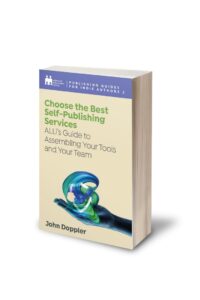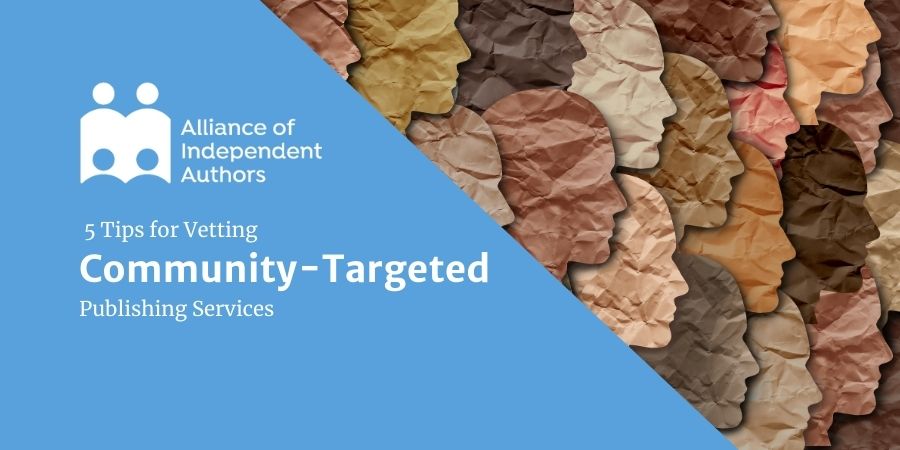In recent years, ALLi's Watchdog Desk has seen an increase in the number of community-specific publishing services. These companies specifically target Christian authors, female authors, LGBTQ authors, authors of color, and other communities with the assurance that they are of that community and understand its unique needs.
To visit our watchdog desk where we vet service providers, have a set of ethical standards for the industry, a directory of services, a guide book on choosing the right services and more, log in to the ALLi membership portal here: allianceindependentauthors.org and navigate to SERVICES > WATCHDOG DESK. If you're not a member then click the link above to find out more.
At its best, these services can be empowering and mutually beneficial to the author and the publisher. But it's a double-edged sword, in the sense that a publishing project will be overseen by someone who shares the author's experiences can defuse suspicions and put the author at ease at a time when they should be most watchful and skeptical.
Here are five tips for avoiding the bad actors.
1. You are hiring a service provider, not supporting a charity.
Some companies try to justify high costs or poor quality by pointing to their charitable contributions. These contributions may take the form of free services for disadvantaged authors, or a percentage of revenue donated to a charity (sometimes operated by the publisher).
While these may be noble goals, they should never be used to excuse poor quality, poor value, or inflated fees. A publishing service is first and foremost a business, and it must meet the standards expected of any other business.
2. Be wary of “sole savior” appeals.
An author-centric company openly discusses the author's options; it opens new possibilities for the author rather than restricting choice. It thrives by finding the right match of services for each author's needs, and by proving its excellence with every book published.
An exploitative company seeks to hide options from the author. It discourages comparison shopping, which can reveal the company's low quality or high fees. Its goal is not to pair authors with the services they need, but rather to ensnare authors and extract as much money as possible from them. Vanity presses often try to exploit an author's insecurities by declaring that the company is the only way to reach success, and that hiring any other company will doom their book to failure. This is a huge red flag, and a good reason to immediately walk away from that company.
3. Don't let appeals to kinship or community obscure problems.
The goal of a sales rep is to establish a rapport with the customer and to break down their resistance. One way of doing that is to establish a sense of trust and shared identity, the feeling that the representative understands and relates to the author in a way that other companies do not.
That understanding can be a valuable asset, but it can also be used to deflect the author's concerns or suspicions. Don't let this happen to you. Predators abound in all corners of the publishing industry, and authors must remain vigilant against them.
Your shared experience with a service provider should come into play only after you have vetted them, comparison shopped, and confirmed their quality and value.
4. Make no assumptions about a company's good intentions or bona fides.
Christian-targeted publishers in particular will emphasize their values, relying on the assumption that those values set them apart from other companies. Nonetheless, some of the worst vanity presses target Christian authors.
Actions speak louder than words. Never assume that a company's claimed values are your values, or that the company actually lives up to those ideals. Rely only on verifiable evidence of their behavior.
5. Always remember that businesses exist to make money.
Ethical companies do so while serving the author's needs conscientiously, transparently, and honestly. Unethical companies consider only how much money they can extract from authors. Both will claim to serve the author.
But ultimately, all companies exist with the goal of being profitable. When a service provider tells you that they're in it for the love of the art, or to support the community, that's great. But don't lose sight of the fact that they've got to pay the rent, too. And as a potential client, it's your job to figure out how much of that money is coming from commissions, and how much is coming out of your pocket.
 Want to know which self-publishing services are reputable, which to avoid, and which offer the best return on investment?
Want to know which self-publishing services are reputable, which to avoid, and which offer the best return on investment?
Choose the Best Self-Publishing Services: ALLi’s Guide to Assembling Your Tools and Your Team gives you everything you need to take control of the fast-changing world of self-publishing, produce a great book, and sell more copies around the world.
To read the book, you can purchase it in our online store here.
If you're an ALLi member, then you can download the book for free by logging into the member website here, and navigating to BOOKS > GUIDEBOOKS.




